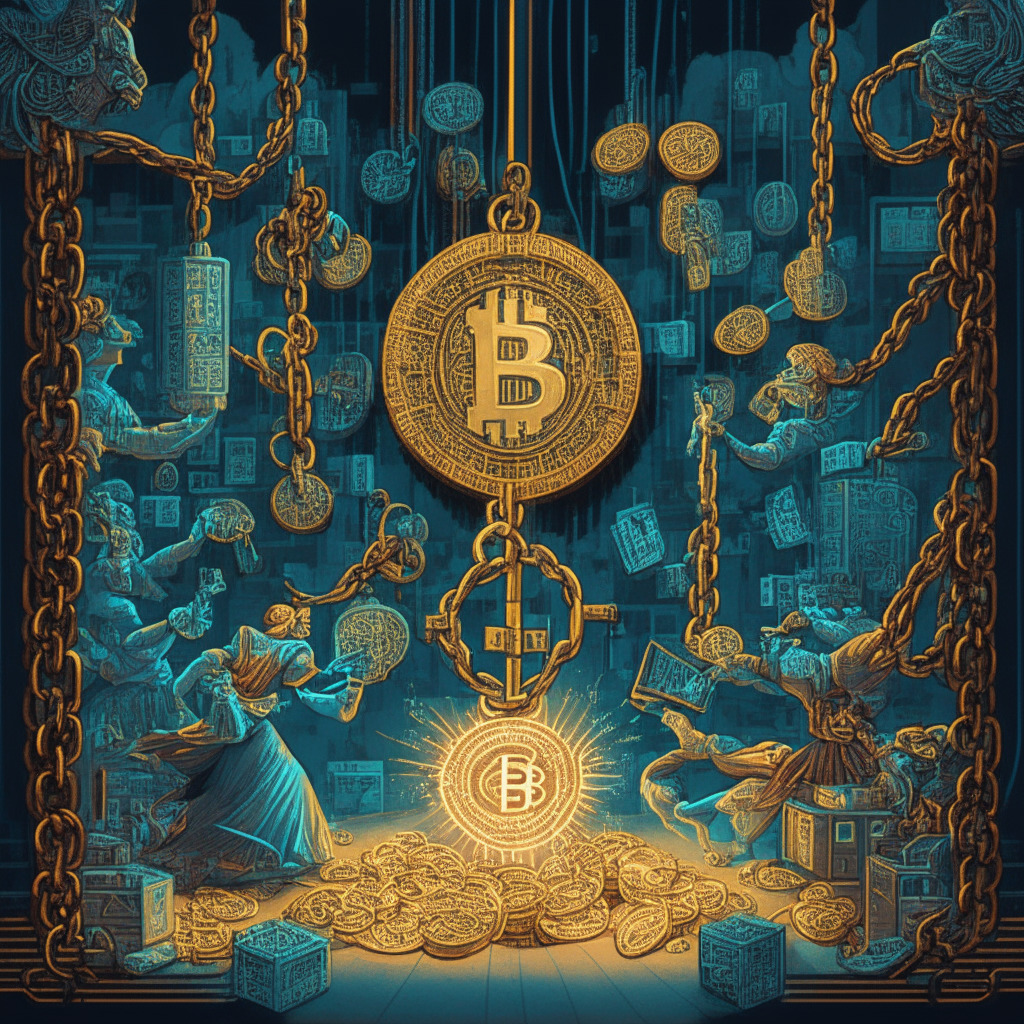Binance, a leading cryptocurrency exchange, has applied for registration in Taiwan under the jurisdiction’s Money Laundering Control Act and Financial Supervisory Commission compliance. This aligns with Taiwan’s efforts to implement Anti-Money Laundering laws for virtual asset service providers amidst a developing regulatory environment.
Search Results for: Paradigm
Unraveling BTC20: The Revolution of Decentralization and Staking on Uniswap
The ‘Bitcoin on Ethereum’ coin BTC20 has gained significant attention on the decentralized exchange Uniswap. Offering an impressive annual percentage yield of 79.47% and stable income stream for stakers, the BTC20 boasts stability with a solid foundation attracting lower-risk-tolerance market participants. It potentially marks a significant gain as Bitcoin surges.
Xverse Raises $5 Million, Aims to Fuel Bitcoin’s Mainstream Adoption: Risks and Rewards
Hong Kong-based startup Xverse, provider of the Bitcoin Web3 wallet, has raised $5 million in seed funding to facilitate the mainstream adoption of Bitcoin. The funds will drive DeFi and Bitcoin scalability solutions, sparking opportunity for the Bitcoin realm to expand.
Blockchain Technology: Revolutionary Rewards or Troublesome Trade-offs?
“Blockchain technology has made significant strides, providing security, transparency, and fast transactions while also facing challenges like energy consumption, security loopholes, and regulatory issues. Its potential and drawbacks set the pace for its widespread reception, urging us to tread with caution.”
Shifting Approaches to Cryptocurrency: Tradition versus Innovation
“Cryptocurrencies and digital assets are gaining acceptance, even among traditional finance (TradFi) heavyweights. Change, however, isn’t without challenges, especially among older generations accustomed to physical assets. Despite security concerns over digital assets, the move towards the digital age is deemed crucial for technological progress.”
Navigating the Waters of a Digital Pound: The UK’s Leap into CBDC’s Future
“The Bank of England is advancing in the world of cryptocurrencies, establishing a new Central Bank Digital Currency (CBDC) Academic Advisory Group. Tasked with facilitating interdisciplinary discussions on a potential digital pound, this group is aimed at managing a multifaceted assembly of expertise, spanning from monetary policy to law, marketing and more. Their success could pave the way for a sustainable and successful digital pound in the future.”
The Curve conundrum: A DeFi Chronicle – Debunking Untouched Vulnerabilities and the Road Ahead
Last month, renowned decentralized exchange, Curve, suffered a hack that led to a loss exceeding $70 million, sending its native token, CRV, into a sharp downward spiral. While ongoing risky lending practices compounded the concern, Curve made a remarkable recovery, recovering almost 75% of the lost assets. This incident underscores the vulnerabilities within DeFi platforms and the importance of preparedness for unexpected events in the decentralized finance space.
Bear Markets: A Paradise for Crypto Investment? Story of Zurich-based L1 Digital AG
Zurich-based L1 Digital AG (L1D) has raised $152 million for its second venture capital fund to support crypto startups and early-stage crypto-centric investment firms. L1D co-founder Ray Hindi explains their unique approach – investing most actively during bear markets. Their investments diversify across digital infrastructure, decentralized finance (DeFi), and decentralized science (DeSci).
Emergence of Regulated Crypto Exchanges: Boon or Bane for the Crypto Industry?
“Blockchain.com has been granted a major payment institution license by the Monetary Authority of Singapore, permitting it to offer regulated digital payment token services to international clients. This reflects Singapore’s ongoing support for crypto companies, contributing to discussions about the impact of increasing regulatory controls on crypto’s foundational values and innovation.”
Blockchain.com Secures Singapore’s MPI License: Balancing Crypto Innovation with Strict Regulation
“Crypto exchange, Blockchain.com, has secured a Major Payment Institution (MPI) license from the Monetary Authority of Singapore (MAS), following its preliminary endorsement last October. This development underscores the exchange’s expansion of its Digital Payment Token services to its institutional clients and investors in Singapore.”
Universities as Powerhouses of Web3 Talent: LBank Labs’ CEO Insight and the Resultant Implications
“Czhang Lin, CEO of LBank Labs, emphasizes the crucial role of universities in the future of Web3. Despite the current market sentiment, Lin maintains there is potential for student-led talent in emerging technologies like AI and Web3. He observed a growing interest among students in decentralized finance (DeFi), liquid staking derivatives (LSD), zero-knowledge (ZK), and decentralized applications (DApps), indicating a possible paradigm shift in the future.”
Bitcoin’s Precarious Perch and Tether’s Depreciating Peg: Understanding Current Market Dynamics
“As Bitcoin continues to balance above $29,000, the crypto market fluctuates, particularly due to Tether’s unstable standing. Unusual dynamics in the stablecoin potentially impacts the volume and exchange value of other cryptocurrencies. Bitcoin’s present downturn might lower its worth to the $28,200 mark.”
India’s Imprint on Global Crypto Legislation: A Leaning Tower or A Firm Stance?
India, the current G20 chair, has recently supported a globally aligned legislative framework for digital assets. Amid potential global regulations, India is pushing for a better understanding of the impact of digital currencies on emerging economies. However, it also highlights potential scams in economies with lax cryptocurrency regulations, enforcing the need for a globally aligned regulatory structure.
Exploring Bitcoin’s Existential Threats and The Besieged Reality of Crypto Exchanges
“Crypto trader Mohit Sorout suggests two scenarios that could potentially threaten Bitcoin: the development of a way to decode seed phrases making Bitcoin vulnerable, and the risk of a hash power takeover, which could put blockchain control into malicious hands. Despite these, Sorout remains optimistic about Bitcoin’s survival.”
Regulating the Crypto Frontier: Stifling Innovation or Safeguarding Investors in Ukraine?
The National Bank of Ukraine’s increased control over local crypto firms has been met with concern. The bank’s demand for full financial transparency raises questions about the potential stifling of this burgeoning industry. Yet, despite the harsh regulatory landscape, the Ukrainian market holds untapped potential, suggesting that this regulatory turbulence could drive Ukrainian crypto stakeholders towards international success.
Bitcoin SV’s Surprising Recovery Rally and the Rise of AI-based Crypto Platforms
“Bitcoin SV is witnessing a recovery rally, supported by the 20DMA and 200DMA, after a previous 34% value loss. This bounce back has triggered a rush of investments into AI-based platforms like yPredict, a platform providing AI-powered crypto signals. The yPredict’s $YPRED token presale carries potential for exponential return, but remember, crypto is a high-risk asset. Trade responsibly.”
Riding the Regulatory Wave: A Deep Dive into Terraform Labs’ Legal Showdown with the SEC
“Terraform Labs, issuer of stablecoin TerraUSD, faces legal issues with the U.S. SEC. Unlike a previous ruling favoring Ripple Labs, Terraform’s motion to dismiss SEC lawsuit was denied. The case, centered on allegations of investor deception and fraud, casts light on the need for clear cryptocurrency regulations.”
Presidential Candidate’s Pro-Crypto Stance: Game Changer or Empty Promise?
Presidential candidate Ron DeSantis’ stance on cryptocurrencies aims to dispel the purported “war on bitcoin and cryptocurrencies” by the current administration. DeSantis’ intent is to allow American citizens the freedom to invest in cryptocurrencies, offering a potential paradigm shift in this sphere.
Risky Profits and Rival Allegations: A Base Layer 2 Network Exploration
The Base network, a testnet built by Coinbase, is witnessing substantial profits through potentially risky trades, one example being the “bald” token (BALD). Market successes hint at high investor trust, but the crypto market’s volatility, coupled with practices like ‘calls,’ raises concerns about the sustainability of such investments. Market liquidity is increasing but there are obstacles, including the unidirectional flow of funds. The uncertain dynamic illustrates the definitive risks of the crypto landscape.
Navigating the Web3 Universe: An In-Depth Look at Launchpad XYZ
“Launchpad XYZ stands out among web3 companies by not only offering trading but also educational content, presale crypto assessments, and branching into gaming and Metaverse. Strong interest in its $LPX token demonstrates confidence in its vision for NFTs, gaming, and beyond.”
Stablecoins: A Safer Alternative to Banking or a Risky Proposition?
“Brendan Malone, a former Federal Reserve Board analyst, posits stablecoins might pose less risk than traditional bank deposits. Stablecoins, such as Tether’s USDT and Circle’s USD Coin, offer an efficiency-laden alternative to traditional banking, given its insulation from the typical crypto volatility.”
Alien Influence on Crypto: Extraterrestrial Intervention or Earthly Innovation?
This article explores a radical concept: Could Bitcoin be a non-human creation introduced by an extraterrestrial civilization? It further delves into the role cryptocurrencies could play in denying government control and promoting the decentralized financial autonomy of individuals, citing it as a possible solution to hypothetical celestial monetary systems.
2023: The Year We Regain Control Over Our Personal Data Through Blockchain?
“Embracing self-sovereignty demands a shift to blockchain and cryptographic technologies. Contrary to centralized systems, decentralization offers individual control of one’s data, identities, and credentials. Web3 technologies promise individuals security for their data. However, achieving self-sovereign data requires extensive real-world infrastructure and new coding paradigms.”
Stablecoins Disrupting Financial System: Are They Really Riskier than Bank Deposits?
According to former Federal Reserve Board analyst, Brendan Malone, stablecoins are less risky than bank deposits and are not akin to money market funds. He argues that stablecoins, backed by fiat currencies and typically short-dated Treasuries, do not pose similar risks as banks due to the absence of mismatches between short-term liabilities and long-term assets. Regulating stablecoins similarly to traditional financial entities could, however, limit competition and increase market dominance.
UK’s Electronic Trade Documents Act 2023: A Blockchain Revolution in Trade Documentation
“The Electronic Trade Documents Act 2023, passed in the UK, enables the digital storage and distribution of trade documents, potentially leveraging blockchain technology. This could enhance security, compliance, and record traceability, and improve workflow efficiency, while considering reliability and security challenges.”
Italy’s Innovative Movement: Uniting DeFi, Token Assets and Banks – A Risk or Revolution?
“The Bank of Italy’s innovation hub is working with Polygon Labs and Fireblocks on a DeFi project to infuse DeFi and tokenized assets into traditional financial institutions. This ecosystem, planned for a six-month span, aims to explore the combination of security tokens and DeFi within a regulated, secure system – a paradigm shift that could redefine financial landscape, but not without its inherent risks and regulatory challenges.”
Unleashing the Potential of IoT: Seven Real-world Applications and the Security Paradox
“The Internet of Things (IoT) integrates physical devices with the digital world, revolutionizing industries by enhancing efficiencies and creating opportunities. Applications include smart home automation systems, predictive maintenance in manufacturing, healthcare tracking devices, smart farming, connected cars, smart cities, and personalized retail experiences. Critics caution about unaddressed ethical and security issues.”
Bridging the Gap between Digital Fashion and Blockchain: The MNTGE Patchwork Collection
“MNTGE’s innovative Patchwork collection combines non-fungible tokens (NFTs) with real-world apparel. Each digital patch includes a physical equivalent with a near-field communication chip to validate ownership. These blockchain-anchored garments present a unique model of ownership tracing, token-gated events, and exclusive experiences.”
Flashbots Secures Massive Funding: A Tipping Point for Ethereum or a Risky Gamble?
Flashbots, the Ethereum-focused R&D startup, gathered $60 million in a Series B funding round to boost the future of a decentrizable network. Their project, SUAVE, aims to counter challenges posed by the Maximum Extractable Value (MEV) and provide cheaper, more private transactions. Yet, the scale of the raised funding brings both excitement and anxiety within the crypto-community regarding Flashbots’ ability to handle the MEV issue.
Binance Expansion Into Japan – A Cryptocurrency Leap or Regulatory Nightmare?
“August 2023 sees Binance confirm the rollout of its full services in Japan. This follows the May 2023 announcement of the platform and its acquisition of Sakura Exchange Bitcoin as an entry point into the Japanese market. Despite regulatory challenges globally, Binance remains hopeful about expansion.”
Vitalik Buterin Probes Worldcoin’s ‘Proof-of-Personhood’ Amid Conceptual Hurdles
Ethereum’s co-founder, Vitalik Buterin, has voiced his concerns about Sam Altman’s new crypto project, Worldcoin. Buterin scrutinized Worldcoin’s novel ‘Proof-of-Personhood’ system, expressing apprehensions on privacy, accessibility, centralization, and security issues related to iris scanning technology known as ‘World ID.’
Twitter’s DM Limitations for Unverified Accounts: A Blow to Free Speech or a War on Spam?
“Twitter’s upcoming implementation of daily DM limits for unverified accounts aims to decrease spam. Critics worry it may increase ‘Twitter Blue’ subscriptions and enhance verification requests, while potentially enabling spamming by verified accounts. These developments appear to lean towards revenue generation rather than combating spam.”































